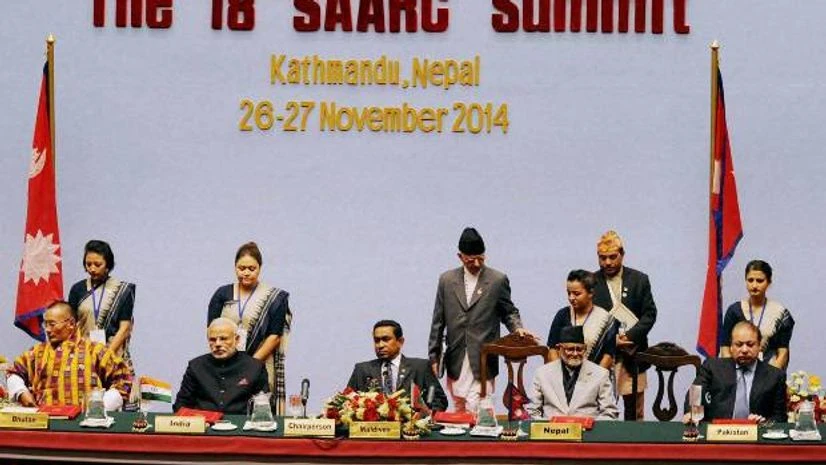The Narendra Modi government is aggressively pushing for a sub-regional grouping - 'BBIN' (comprising Bangladesh, Bhutan, India and Nepal) - under the larger ambit of the eight-member South Asian Association for Regional Cooperation (Saarc).
A joint working committee (JWC) on BBIN has already met twice. The earlier one was here, on January 30 and 31. This was the first time all four countries participated. The next JWC is expected in the second half of this year, in Dhaka.
The creation of BBIN was conceptualised in 2013, by the previous government. Now Prime Minister Modi has put his weight behind the concept. This is also to give a signal to Pakistan that if it does not cooperate in implementing the Saarc vision, sub-regional groupings such as this will take off.
More From This Section
This was one of the issues that foreign secretary S Jaishankar is learnt to have taken up with Pakistan during his visit there earlier this month. The government has made the alternative route amply clear to the Pakistan government, it is learnt.
"The BBIN initiatives clearly reflect Prime Minister Narendra Modi's desire to integrate the South Asian economy. The message is clear - if the Saarc route is clogged, impediments are dragged up, then India will not hesitate to encourage sub-regionalism," stated Amit Kumar, research fellow, Indian Council of World Affairs, in a report. According to MEA officials, the government is also planning to rope in Sri Lanka and Maldives at a later stage with enhanced maritime links, leaving only Pakistan and Afghanistan within SAARC. However, it is expected that now Pakistan will also gear up to implement some of the Saarc initiatives like the Motor Vehicles Agreement and the Railways Agreement as the next Saarc summit is going to be held in Islamabad.
"It makes a lot of sense to create such a grouping within Saarc that will be complementary to Saarc. BBIN trade is much larger than the trade between Pakistan, India and Afghanistan. This region is doing much better than the others in Saarc. Besides, the banking and financial services channels are much better in BBIN," said Prabir De, professor, Research and Information System for Developing Countries.
During the JWC meeting it was also decided that BBIN would explore a mechanism on how to initiate trading in power between these four countries, with effective implementation of inter-grid connectivity. The MEA had said in a statement member-countries also discussed water resource management during the two-day JWC meet.
"The initiative can act as a building block to the overall process of Saarc integration. It is worth noting that India is the largest trading partner in Saarc for Bangladesh, Bhutan and Nepal; thus, it is important that the issues of connectivity and infrastructure are addressed. Within BBIN, the issue of security is not as sensitive as in Saarc," said Rajan Sudesh Ratna, economic affairs officer at the United Nation's Economic and Social Commission for the Asia-Pacific.
It took stock of existing bilateral arrangements on data sharing for flood forecasting and ways of improving it. Exchanging 'best practices' on basin-wide water resources management and development was also discussed.

)
